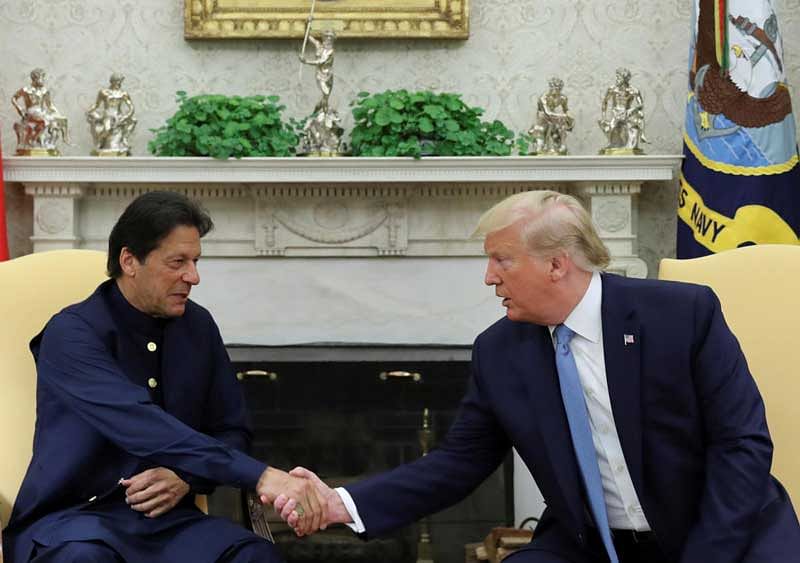
The historic session of Parliament on August 5 has changed the dynamics of Indian politics and shaken the very fundamentals of India-Pakistan relations. The abrogation of Articles 370 and 35-A, along with the decision to declare Jammu and Kashmir a Union Territory, has put Pakistan and the power behind Imran Khan in a bind.
Close on the heels of Prime Minister Narendra Modi registering an impressive win in the 2019 elections, Imran Khan, Prime Minister of an economically bankrupt Pakistan, ran to the White House. There, he dusted out the Afghanistan policy that his predecessors used whenever their coffers went dry.
Elaborating on his White House meeting with Donald Trump, Khan said he had assured the US President that he would meet the Taliban leadership and try his best to get them to talk to the Afghan government. Under US supervision, Khan spoke to Afghan President Ashraf Ghani who has always refused, and rightly so, to talk to the Taliban.
The US needs ground forces to keep its interests in Kabul intact, but without having to take body bags home. India has for long, and consistently, refused to commit its boots on Afghan soil, just as New Delhi refused to do in Iraq when the US suggested a trade-off of our soldiers for reconstruction contracts.
Meanwhile, Imran Khan’s Kartarpur corridor olive branch and soft messages of talks with India were touted as genuine peace overtures to convince the White House to mount pressure on New Delhi to fall in line.
The US entered Afghanistan with a promise to end terrorism, eliminate the regressive and radicalised Taliban and speed up its economy, which the Taliban had devastated. During its years ruling Kabul, the Taliban introduced the regressive Sharia Law, terrorised the country and subjected civilians, especially women and girls, to the worst kinds of inhuman treatment until it was ousted from power in 2001.
Trump now seeks to resurrect that very Taliban, which has killed civilians and US army personnel alike. Worse still, he wants Pakistanto be the cheerleader of the peace process.
Pakistan’s Foreign Minister Shah Mehmood Qureshi has threatened to withdraw from the Afghan peace talks if the India-Pakistan border remains disturbed. If the tensions between the two countries escalate, it will have serious repercussions on the Afghan peace process “which Pakistan is spearheading,” he is reported to have said.
Pakistan should know that it is not leading the Afghan peace process, and Islamabad should be under no such illusion. New Delhi will also have to convey its displeasure and apprehensions on the resurrection of the Taliban and the undue importance and responsibility vested on Imran Khan by the White House in its haste to quit the 18-year mess that the US has got itself into.
After the Doha peace process talks, some quarters are critical of New Delhi’s approach towards the Afghan issue. While they are free to express their views, they must also realise that the Modi government is only carrying forward the process initiated by earlier dispensations in New Delhi. Besides, in the (unlikely) event of a complete US withdrawal and the Taliban obtaining total control of Afghanistan, Pakistan will divert all of its terrorist resources towards more misadventures in J&K, seriously impinging on our security.
It is doubtful if Beijing and Moscow, the other two players in the four-country peace process, would like the US to hand over Kabul to Taliban and Pakistan. China has openly taken exception to keeping India out of the peace talks. Any strategic advantage acquired by Islamabad will cause disequilibrium in the keenly contested regional supremacy powerplay.
It is possible that General Headquarters, Rawalpindi, the real power behind Islamabad’s strategy and security apparatus, has begun shifting some of the Taliban commanders from its western border to facilitate their infiltration across the border with India to foment trouble in J&K.
New Delhi has every right to take appropriate steps to prevent the infiltration, checkmate Pakistan’s GHQ, neutralise the non-state actors and provide security to the locals. In all these sensitive operations, it becomes imperative to clear the area of tourists and visitors so that they do not end up as collateral damage.
It is crucial for Trump to withdraw from Afghanistan at any cost and at the earliest in order to win the 2020 US presidential elections. But India is not obliged to ensure Trump’s victory at the cost of its national security, integrity and self-esteem. New Delhi should liquidate Pakistan’s terror apparatus before it is too late. And hence, the force build-up in J&K is fully justified.
It should be none of New Delhi’s concern if a tense India-Pakistan border is bad news for Trump.
